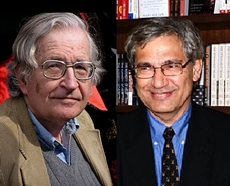Noam Chomsky, Nobel laureate Pamuk join chorus against JNU student’s arrest
17 Feb 2016
Eminent academicians, scientists and writers from across the world, including Massachusetts Institute of Technology Professor Emeritus Noam Chomsky and Nobel laureate Orhan Pamuk, have recorded their condemnation of the arrest of a Jawaharlal Nehru University student in a strongly-worded statement that says it is "evidence of the present government's deeply authoritarian nature, intolerant of any dissent".
 | |
| MIT professor emeritus Noam Chomsky and Nobel laureate Orhan Pamuk |
A statement signed by 86 academicians from renowned universities also condemns "the culture of authoritarian menace that the present government in India has generated".
The statement says, "We have learnt of the shameful act of the Indian government which, invoking sedition laws formulated by India's colonial rulers, ordered the police to enter the Jawaharlal Nehru University campus and unlawfully arrest a student leader. Kanhaiya Kumar, on charges of inciting violence - without any proof whatever of such wrongdoing on his part."
Kanhaiya Kumar was arrested last week for allegedly shouting anti-India slogans during an event held on the campus on 9 February in support of Parliament attack convict Afzal Guru, who was hanged three years ago.
Kumar has been charged with sedition, for which the maximum punishment is a life term. A report by the Delhi Police on the arrest credits "reliable sources" to explain sedition charges against the student.
Expressing solidarity with protesting JNU students and faculty, who have boycotted classes to press for Kumar's release, the statement says, "Mr Kumar, whose speech (widely available on a video) cannot in any way be connected with the slogans uttered on the previous day, was nonetheless arrested for 'anti-national' behaviour and for violating the sedition laws against the incitement to violence.
''Since there is no evidence to establish these charges, we can only conclude that this arrest is further evidence of the present government's deeply authoritarian nature, intolerant of any dissent, setting aside India's longstanding commitment to toleration and plurality of opinion, replicating the dark times of an oppressive colonial period and briefly of the Emergency in the mid-1970s."
The action of the police had brought "great dishonour" to the government, the signatories assert, and urge "all those genuinely concerned about the future of India and Indian universities to protest in wide mobilisation against it".


















